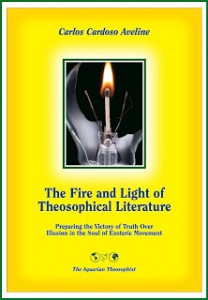
Why the Theosophical Movement Should Not
Exaggerate in Social Courtesy and Good Manners
Carlos Cardoso Aveline

“It is the duty of esoteric students to unmask
error and hypocrisy, to face lie with truth, not
as personal criticisms but as facts against
mis-statements. (…..) The custodians of the Truth
voice it in the face of lie, ignorance and error, and
take every opportunity possible to correct erroneous
impressions. Theosophy is in the world for that purpose.”
[Robert Crosbie]
What are the differences between brotherhood and courtesy?
There must be some, for the Masters and H.P. Blavatsky promote brotherhood while denouncing any exaggeration of social courtesy and good manners.
Brotherhood is connected to the heart. Courtesy is a “social skill”. Brotherhood belongs to the world of Reality. Courtesy is an ability used in the world of appearances.
Brotherhood is sincere and spontaneous; but courtesy – although not necessarily insincere – is often calculated. Brotherhood is an expression of Theosophy and the Doctrine of the Heart. As to courtesy, as long as it becomes such a priority that it blocks true sincerity, it is an expression of pseudo-theosophy and the Doctrine of the Eye.
The more one’s true feelings are suffocated in the name of courtesy and good manners, the more they get “unkind” in appearance. Then, they need an ever-growing amount of control, and ever deeper layers of “courtesy”. From this process emerges hypocrisy. And hypocrisy produces deeply destructive feelings, which will be, on their turn, severely suffocated. But this will only provoke further “emotional explosions”.
Wherever sincerity is not allowed, good will tends to disappear. From this, come hatred and enmity, which are the precise opposites of brotherhood. These unbrotherly feelings, of course, work in disguised form.
On the other hand, it is important to say that self-control is not the same as renouncing frankness. It does not imply practicing any excessive amount of “courtesy”. It is by allowing people to be frank – and by being frank ourselves – that we preserve the very substance of brotherhood, which is sincerity. Self-control cannot be separated from love for truth.
Direct talk must be combined with a sense of impersonal brotherhood and a psychological ahimsa (non-violence) which emerges from a respect for all beings. These feelings are intimately connected to the foundations of the lasting victory needed – and deserved – by the theosophical movement in the present century.
A direct and confident dialogue on the difficulties and challenges of the movement is an inevitable task in the years and decades ahead.
Dead bodies do not renew themselves, but the movement is alive, and just as every living organism, it needs to renew itself at each new step. The first half of the present century is, of course, no exception.
In order for the movement to constantly renew itself, its wounds must be in direct contact with fresh air, so that they can heal. A frank debate must then be stimulated, allowing truth to emerge from under any undesirable layers of diplomacy and good manners that may exist.
H. P. Blavatsky’s blunt style of telling things in a direct way has been widely misinterpreted by some. Her exaggerated frankness has been classified as a mistake, and as something coming from her lower self. This is only part of the truth. She was far from perfect, of course, but her Master, who was her model, happened to have the same style, and His frankness also shocked Western lay disciples.
Is this issue a matter of mere personalities, then? Or is there a higher principle at stake? There seems to be a deeper lesson in it, for students to watch and learn.
In one of the Letters, an Adept-Teacher examines what is – from the Theosophical viewpoint – the challenge of BEING TRUTHFUL, instead of just trying to look like a kind and spiritualized being to the eyes of the others.
Using most simple words in an attempt to be understood by his lay chela, the Master says:
“… You have to remember that our Eastern ideas about ‘motives’ and ‘truthfulness’ and ‘honesty’ differ considerably from your ideas in the West. Both we believe that it is moral to tell the truth and immoral to lie; but here every analogy stops and our notions diverge in a very remarkable degree. For instance it would be a most difficult thing for you to tell me, how it is that your civilized Western Society, Church and State, politics and commerce have ever come to assume a virtue that it is quite impossible for either a man of education, a statesman, a trader, or anyone else living in the world – to practice in an unrestricted sense? Can any one of the above mentioned classes – the flower of England’s chivalry, her proudest peers and most distinguished commoners, her most virtuous and truth speaking ladies – can any of them speak the truth, I ask, whether at home, or in Society, during their public functions or in the family circle? What would you think of a gentleman, or a lady, whose affable politeness of manner and suavity of language would cover no falsehood; who, in meeting you would tell you plainly and abruptly what he thinks of you, or of anyone else? And where can you find that pearl of honest tradesmen or that god-fearing patriot, or politician, or a simple casual visitor of yours, but conceals his thoughts the whole while, and is obliged under the penalty of being regarded as a brute, a madman – to lie deliberately, and with a bold face, no sooner he is forced to tell you what he thinks of you; unless for a wonder his real feelings demand no concealment? All is lie, all falsehood, around and in us, my brother; and that is why you seemed so surprised, if not affected, whenever you find a person, who will tell you bluntly truth to your face; and also why it seems impossible for you to realize that a man may have no ill feelings against you, nay even like and respect you for some things, and yet tell you to your face what he honestly and sincerely thinks of you.”[1]
These words seem to be clear enough.
As to H.P.B., she was an Eastern disciple, and she explained the matter thus:
“No ‘cultured’ man or woman will ever show anger in Society. To check and restrain every sign of annoyance shows good manners, certainly, but also considerable achievement in hypocrisy and dissimulation. There is an occult side to this rule of good breeding expressed in an Eastern proverb: ‘Trust not the face which never shows signs of anger nor the dog that never barks.’ Cold-blooded animals are the most venomous.” [2]
Truth and truthfulness sometimes burn people, or rather they burn their lack of wisdom, their outer shell of self-importance, with which they so often identify themselves. We should therefore get rid of any tendency to exaggerate the importance of courtesy in our theosophical lives. Robert Crosbie shared the same viewpoint, and he wrote:
“It is the duty of esoteric students to unmask error and hypocrisy, to face lie with truth, not as personal criticisms but as facts against mis-statements (…..) The custodians of the Truth voice it in the face of lie, ignorance and error, and take every opportunity possible to correct erroneous impressions. Theosophy is in the world for that purpose.”[3]
Elsewhere, the founder of the United Lodge of Theosophists said:
“Yes, it is war; but not against persons. War for the Truth – the eternal ideas, the eternal thought in the Eternal Mind; war against error, cant, and hypocrisy.”[4]
As long we remember these basic and fundamental statements, we can effectively TRY to live up to the motto of the movement.
For, indeed, although harmlessness in intention is important, there must be no religion – or courtesy, diplomacy or good manners – higher than truth.
NOTES:
[1] “The Mahatma Letters to A. P. Sinnett”, Transcribed by A. T. Barker, facsimile edition, Theosophical University Press, Pasadena, California, 1992, Letter XXX, p. 232.
[2] “From the Note Book of an Unpopular Philosopher”, by H.P. Blavatsky, in “Collected Writings”, TPH, 1960, vol. VIII, p. 137. Published for the first time in the “Lucifer” magazine, October 1887. The text is also available at our associated websites.
[3] “A Book of Quotations”, by Robert Crosbie, Theosophy Company, Mumbai, India, p. 34. The book is also available in PDF at our associated websites.
[4] “A Book of Quotations”, p. 57.
000
On the role of the esoteric movement in the ethical awakening of mankind during the 21st century, see the book “The Fire and Light of Theosophical Literature”, by Carlos Cardoso Aveline.

Published in 2013 by The Aquarian Theosophist, the volume has 255 pages and can be obtained through Amazon Books.
000